高考英语 基础知识练习 动词的讲解与训练
高考英语动词及动词短语知识点及高频考点练习(含答案)
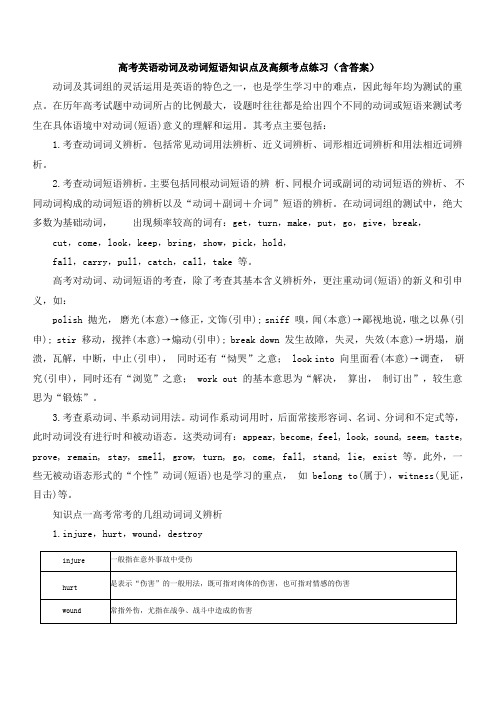
高考英语动词及动词短语知识点及高频考点练习(含答案)动词及其词组的灵活运用是英语的特色之一,也是学生学习中的难点,因此每年均为测试的重点。
在历年高考试题中动词所占的比例最大,设题时往往都是给出四个不同的动词或短语来测试考生在具体语境中对动词(短语)意义的理解和运用。
其考点主要包括:1.考查动词词义辨析。
包括常见动词用法辨析、近义词辨析、词形相近词辨析和用法相近词辨析。
2.考查动词短语辨析。
主要包括同根动词短语的辨析、同根介词或副词的动词短语的辨析、不同动词构成的动词短语的辨析以及“动词+副词+介词”短语的辨析。
在动词词组的测试中,绝大多数为基础动词,出现频率较高的词有:get,turn,make,put,go,give,break,cut,come,look,keep,bring,show,pick,hold,fall,carry,pull,catch,call,take 等。
高考对动词、动词短语的考查,除了考查其基本含义辨析外,更注重动词(短语)的新义和引申义,如:polish 抛光,磨光(本意)→修正,文饰(引申); sniff 嗅,闻(本意)→鄙视地说,嗤之以鼻(引申); stir 移动,搅拌(本意)→煽动(引申); break down 发生故障,失灵,失效(本意)→坍塌,崩溃,瓦解,中断,中止(引申),同时还有“恸哭”之意; look into 向里面看(本意)→调查,研究(引申),同时还有“浏览”之意; work out 的基本意思为“解决,算出,制订出”,较生意思为“锻炼”。
3.考查系动词、半系动词用法。
动词作系动词用时,后面常接形容词、名词、分词和不定式等,此时动词没有进行时和被动语态。
这类动词有:appear, become, feel, look, sound, seem, taste, prove, remain, stay, smell, grow, turn, go, come, fall, stand, lie, exist 等。
高考英语动词及动词短语精讲教案

高考英语动词及动词短语精讲教案一、教学目标:1. 让学生掌握高考常见的动词及其词义、搭配和用法。
2. 提高学生对动词短语的识别和运用能力。
3. 培养学生运用所学知识进行口语表达和写作的能力。
二、教学内容:1. 动词的分类及用法2. 动词短语的识别和运用3. 动词与介词、副词的搭配4. 动词的时态和语态5. 动词及动词短语在句中的位置和功能三、教学重点与难点:1. 重点:动词的分类、用法,动词短语的识别和运用。
2. 难点:动词与介词、副词的搭配,动词的时态和语态。
四、教学方法:1. 任务型教学法:通过完成各种任务,让学生在实践中学习和运用动词及动词短语。
2. 互动式教学法:引导学生进行小组讨论和合作,提高学生的口语表达和交流能力。
3. 案例分析法:通过分析典型例句,让学生掌握动词及动词短语的用法。
五、教学步骤:1. 引入:通过提问方式引导学生回顾已学过的动词及其用法。
2. 新课导入:介绍本节课要学习的动词及其词义、搭配和用法。
3. 讲解与练习:讲解动词与介词、副词的搭配,动词的时态和语态。
通过练习题让学生巩固所学知识。
4. 动词短语的学习:介绍本节课要学习的动词短语,讲解其意义和用法。
5. 小组讨论:让学生分组讨论如何运用所学知识进行口语表达和写作。
6. 案例分析:分析典型例句,让学生掌握动词及动词短语的用法。
7. 课堂小结:总结本节课所学内容,强调重点和难点。
8. 作业布置:布置相关练习题,巩固所学知识。
9. 课后反思:教师反思教学效果,针对学生的掌握情况调整教学策略。
10. 课后辅导:针对学生的疑问进行个别辅导,提高学生的学习效果。
六、教学评价:1. 课堂参与度:观察学生在课堂上的参与情况,是否积极回答问题、参与讨论。
2. 练习完成情况:检查学生完成练习的情况,包括正确率和完成时间。
3. 小组讨论:评价学生在小组讨论中的表现,包括口语表达和合作能力。
4. 课后作业:检查学生完成课后作业的情况,包括正确率和完成时间。
高考英语动词知识点技巧及练习题附解析(4)
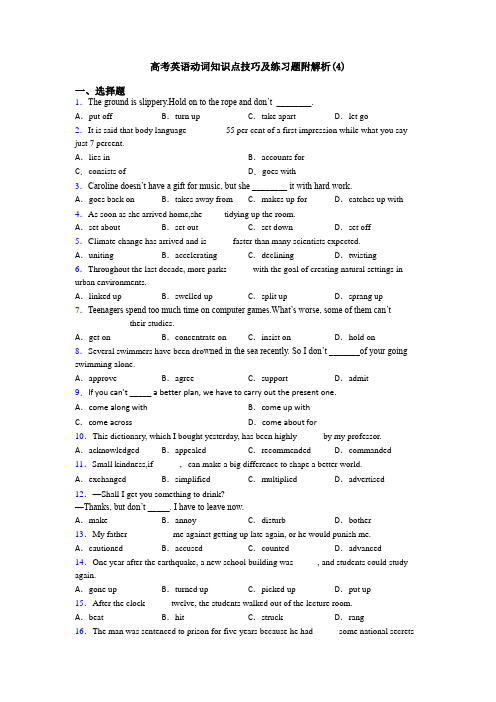
高考英语动词知识点技巧及练习题附解析(4)一、选择题1.The ground is slippery.Hold on to the rope and don’t ________.A.put off B.turn up C.take apart D.let go2.It is said that body language ________ 55 per cent of a first impression while what you say just 7 percent.A.lies in B.accounts forC.consists of D.goes with3.Caroline doesn’t have a gift for music, but she ________ it with hard work.A.goes back on B.takes away from C.makes up for D.catches up with 4.As soon as she arrived home,she_____tidying up the room.A.set about B.set out C.set down D.set off 5.Climate change has arrived and is _____ faster than many scientists expected.A.uniting B.accelerating C.declining D.twisting 6.Throughout the last decade, more parks _____ with the goal of creating natural settings in urban environments.A.linked up B.swelled up C.split up D.sprang up 7.Teenagers spend too much time on computer games.What’s worse, some of them can’t____________ their studies.A.get on B.concentrate on C.insist on D.hold on 8.Several swimmers have been dro wned in the sea recently. So I don’t _______of your going swimming alone.A.approve B.agree C.support D.admit9.If you can’t _____ a better plan, we have to carry out the present one.A.come along with B.come up withC.come across D.come about for10.This dictionary, which I bought yesterday, has been highly______by my professor. A.acknowledged B.appealed C.recommended D.commanded 11.Small kindness,if______,can make a big difference to shape a better world. A.exchanged B.simplified C.multiplied D.advertised 12.—Shall I get you something to drink?—Thanks, but don’t _____. I have to leave now.A.make B.annoy C.disturb D.bother13.My father__________ me against getting up late again, or he would punish me. A.cautioned B.accused C.counted D.advanced 14.One year after the earthquake, a new school building was _____, and students could study again.A.gone up B.turned up C.picked up D.put up15.After the clock _____ twelve, the students walked out of the lecture room.A.beat B.hit C.struck D.rang16.The man was sentenced to prison for five years because he had _____ some national secretsA.given in B.given away C.given out D.given off 17.Some good habits at young ages help to_________ our character in later life.A.pass B.reduce C.revise D.form18.The present situation is very complex, so I think it will take me some time to ____________ its reality.A.make up B.figure outC.look through D.put off19.The good thing about children is that they _____________ very easily to new environments. A.adapt B.appealC.attach D.apply20.—I’m still working on my project.—Oh, you’ll miss the deadline. Time is _________.A.running out B.going outC.giving out D.losing out21.Bears ________ fat stores throughout the summer and fall to have energy enough to last them through winter sleep.A.build up B.pack up C.bring up D.take up22.As nobody here knows what is wrong with the machine, we must send for an engineer to_________ the problem.A.handle B.raiseC.face D.present23.I used to quarrel a lot with my parents,but now we________fine.A.look out B.stay upC.carry on D.get along24.—Why did you move to this village?—To _____ the traffic and noise in the city.A.get along B.get away C.get along with D.get away from 25.He fell in love__________Mary and asked her to marry__________him.A.to;with B.with;toC.with;with D.with;/【参考答案】***试卷处理标记,请不要删除一、选择题1.D解析:D【解析】【分析】考查动词短语辨析。
高考英语一轮复习 语法点专题讲解 动词高三全册英语试题

一、动词概述1、动词的定义:表示动作和状态的词叫作动词。
2、动词的种类:(1)实义动词:表示行为、动作或状态的词。
实义动词词义完整,能作谓语,亦称为行为动词。
(2)系动词: 亦称连系动词,是用来帮助说明主语“是什么”或“怎么样”的动词,系动词本身有词义,但不能用作谓语,后边必须跟表语,构成系表结构说明主语的状况、性质、特征等情况。
(3)情态动词: 情态动词用在实义动词前,表示说话人对这一动作或状态的看法或主观设想。
情态动词本身有一定词义,但是不能作谓语,只能和实义动词一起构成谓语。
(4)助动词: 表示不同的时态、语态以及句子的否定和疑问。
助动词本身无词义,不可作谓语,只能协助主要动词构成谓语。
二、动词考点纵览三、综合练习1、系动词和助动词的用法( ) 1. The fish very delicious.A. smellsB. tastesC. looksD. sounds ( ) 2. What Mrs. White said sounds____.A. friendlyB. wonderfullyC. pleasantlyD. nicely ( ) 3. The poor girl ____ blind at the age of four.A. turnedB. goesC. becameD. went( ) 4. When she was a child she____ .A. grew patienceB. was aliveC. ran wildD. came true( ) 5. Her voice____ as if she has a cold.A. soundsB. listensC. hearsD. seems( ) 6. This skirt___ as if it is made of cotton.A. isB. looksC. feelsD. seems ( ) 7. She looks ___ she hadn’t had a good meal for a week.A. thatB. as ifC. whenD. so far ( ) 8. It ____that he was late for the bus.A. looksB. turnsC. getsD. seems ( ) 9. These oranges taste_____.A. to be goodB. to be wellC. wellD. good ( ) 10. ---Do you like the skirt?---Yes, it ____ very soft.A. feelsB. feltC. is feelingD. is felt( ) 11. The moment Mr. Green went to bed, he____ asleep.A. keptB. gotC. fellD. fall( ) 12. When I went home yesterday, it was ____ dark.A. goingB. gettingC. runningD. coming( ) 13. His plan ____ to be a perfect one.A. provedB. was provedC. is provingD. proving ( ) 14. The flowers in the garden ____ sweet.A. soundB. tasteC. becomeD. smell( ) 15. He____ like his father in character.A. looksB. seemsC. isD. feels ( ) 16. It____ another fine day tomorrow.A. seemsB. promisesC. appearsD. looks ( ) 17. She ____ much younger than she really is.A. appearsB. growsC. becomesD. turns ( ) 18. You____ very pale. Do you feel sick?A. lookedB. lookC. lookingD. are looked ( ) 19. His wish to become a policeman has ____true.A. turnedB. realizedC. comeD. grown( ) 20. Her father ____a pilot.A. turnedB. grewC. has turnedD. has become ( ) 21. Penny and I _______in Canada now.A. livesB. livingC. are livingD. lived( ) 22. Su Hai is _____to Canada.A. comeB. comingC. comesD. came( ) 23. Did you ______a good trip?A. haveB. hasC. hadD. having( ) 24. I’ll _____you the rooms in my house.A. showingB. to showC. showD. shows( ) 25.You can ______your hands in the bathroom.A. washesB. washedC. washD. washing2、情态动词的用法( ) 1. John___ come to see us tonight, but he isn’t very sure yet.A.mayB. canC. has toD. must( ) 2. They ___ do well in the exam.A. can be able toB. be able toC. can able toD. are able to( ) 3. ---May I take this book out?---No, you___.A. can’tB. may notC. needn’tD. aren’t ( ) 4. You___ go and see a doctor at once because you’ve got a fever.A. canB. mustC. dareD. would( ) 5. ---Can you speak Japanese?---No, I____.A. mustn’tB. can’tC. needn’tD. may not ( ) 6. ---He___ be in the classroom, I think.---No, he ___ be in the classroom. I saw him go home a minute ago.A. can; may notB. must; may notC. may; can’tD. may; mustn’t( ) 7. ---Shall I get one more cake for you, Dad?---Thanks, but you___, I’ve had enough.A. may notB. must notC. can’tD. needn’t ( ) 8. Even the top students in our class can’t work out this problem, so it be very difficult.A. mayB. mustC. canD. need( ) 9. He isn’t at school. I think he ___ be ill.A. canB. shallC. mustD. has to( ) 10. ___ I take this one?A. MayB. WillC. AreD. Do( ) 11. The children___ play football on the road.A. can’tB. canC. mustn’tD. must( ) 12. You ___ be late for school again next time.A. mustn’tB. needn’tC. don’t have toD. don’t need to( ) 13. ---Must I do my homework at once?---No, you___.A. needn’tB. mustn’tC. can’tD. may not ( ) 14. His arm is all right. He___ go and see the doctor.A. has not toB. don’t have toC. haven’t toD. doesn’t have to( ) 15. He had to give up the plan, ___ he?A. didB. didn’tC. doesD. doesn’t( ) 16. They had to walk here, ___ they?A. mustn’tB. didC. didn’tD. hadn’t( ) 17. He had better stay here, ___ he?A. didn’tB. don’tC. hadn’tD. isn’t( ) 18. You’d better___late next time.A. not to beB. not beC. won’t beD. don’t be ( ) 19. You’d better ___ your hair ___ once a month.A. had; cutB. had; cuttedC. have; cutD. have; cutted( ) 20. You___ ask that man over there. Maybe he knows the way.A. had better not toB. had not betterC. had betterD. had better not( ) 21. ---Shall we go and visit the History Museum next Sunday? --- .A. Here you areB. Sorry, I can’tC. Yes, pleaseD. Let me try( ) 22. ---Why don’t you ask Mike to go with us?---Thanks, ___.A. I willB. I won’tC. I canD. I may ( ) 23. ---___ I take the newspaper away?---No, you mustn’t. You____read it only here.A. Must; canB. May; canC. Need; mustD. Must; must ( ) 24. Excuse me,___ you please pass me that cup?A. doB. shouldC. wouldD. must( ) 25. ___ you like to have another try?A. CouldB. WillC. WouldD. Do ( ) 26. ---Would you like to go boating with us?---Yes, ___.A. I’d likeB. I wantC. I’d like toD. I do ( ) 27. You___ worry about your son. He will get well soon.A. needn’tB. can’tC. mustn’tD. have to ( ) 28. The poor man needs our help, ___ he?A. needB. doesn’tC. doesD. needn’t( ) 29. ---Must we do our homework now?---No, you___. You may have a rest first.A. mustn’tB. needn’tC. may notD. can’t ( ) 30. Can you speak Japanese? No, I_____A. mustn’tB. can’tC. needn’tD. may not3、动词不定式、动名词和分词的用法( ) 1. Where is my passport? I remember______it here.You did not left it here. Remember_____it with you all the time.A. to put; to takeB. putting; to takeC. to put; takingD. putting; taking( ) 2. The tourists enjoy________ on the beach.A. lieB. liesC. lyingD. lay( ) 3. Would you like _________to the theatre with me?A. to goB. goingC. goD. be going( ) 4. They find it _________with animals.A. interesting to playB. interested to playC. interesting playingD. interested playing( ) 5. Would you mind_____quiet for a moment? I’m trying_____a form.A. keeping; to fill outB. keeping; fill outC. to keep; to fill outD. to keep; fill out( ) 6. Grandma said that she had a lot of trouble________your handwriting.A. to readB. to seeC. readingD. inseeing( ) 7. The thief took away the woman’s wallet without____ anything.A. sayingB. sayC. saidD. to say( ) 8. Please stop ____, boys, I have something important to ____ you.A. saying; talkB. telling; sayC. talking; speakD. talking; tell( ) 9. What about ____ double quantities of everything today? We have hardly time to go____ next week.A. buying; to shopB. buy; shoppingC. buying; shoppingD. to buy; shopping( ) 10. After ____ for the job, you will be required to take a language test.A. being appliedB. appliedC. applyingD. apply( ) 11. ---Why were you so late for work today?---____ to the office was very slow this morning because of the traffic.A. DrivingB. DrivesC. DriveD. Drove( ) 12. How can you keep the machine ____when you are away?A. runB. to runC. runningD. being run ( ) 13. It was impolite of him ____without ____goodbye.A. to leave; sayingB. leaving; to sayC. to leave; to sayD. leaving; saying( ) 14. ---Why was Fred so sad?---He isn’t used ____ alone.A. beB. to beC. to beingD. having been( ) 15. After finishing his homework he went on______a letter to his parents.A. writeB. writingC. to writeD. wrote参考答案1、系动词和助动词的用法1. B2. A3. D4. C5. A6. C7. B8. D9. D 10. A 11. C 12. B 13. A 14. D 15. C 16. B 17. C 18. B 19. C 20. D 21. C 22. B 23. A 24. C 25. C2、情态动词的用法1. A2. D3. A4. B5. B6. C7. D8. B9. C 10. A 11. C 12. A13. A 14. D 15. B 16. C 17. A 18. B 19. C 20. C 21. B22. A 23. B 24.C 25. C 26. C 27. A 28. B 29. B 30. B3、动词不定式、动名词和分词的用法1. B2. C3. A4. A5. A6. C7. A8. D9. C 10. C 11. A 12.C 13. A 14. C 15. C。
高考英语动词及动词短语精讲教案
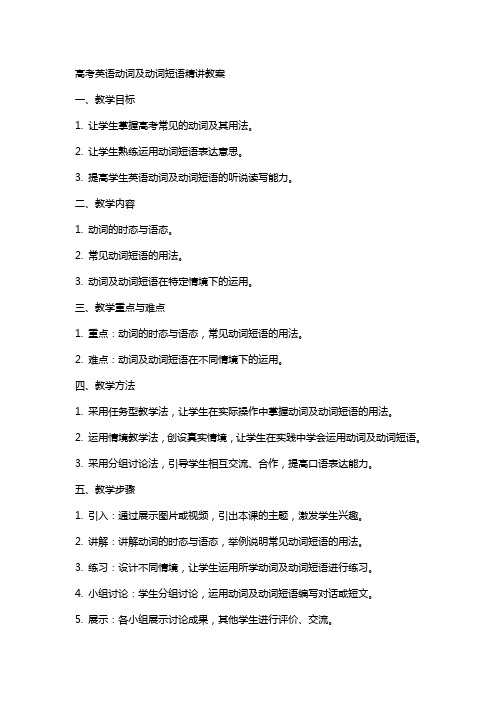
高考英语动词及动词短语精讲教案一、教学目标1. 让学生掌握高考常见的动词及其用法。
2. 让学生熟练运用动词短语表达意思。
3. 提高学生英语动词及动词短语的听说读写能力。
二、教学内容1. 动词的时态与语态。
2. 常见动词短语的用法。
3. 动词及动词短语在特定情境下的运用。
三、教学重点与难点1. 重点:动词的时态与语态,常见动词短语的用法。
2. 难点:动词及动词短语在不同情境下的运用。
四、教学方法1. 采用任务型教学法,让学生在实际操作中掌握动词及动词短语的用法。
2. 运用情境教学法,创设真实情境,让学生在实践中学会运用动词及动词短语。
3. 采用分组讨论法,引导学生相互交流、合作,提高口语表达能力。
五、教学步骤1. 引入:通过展示图片或视频,引出本课的主题,激发学生兴趣。
2. 讲解:讲解动词的时态与语态,举例说明常见动词短语的用法。
3. 练习:设计不同情境,让学生运用所学动词及动词短语进行练习。
4. 小组讨论:学生分组讨论,运用动词及动词短语编写对话或短文。
5. 展示:各小组展示讨论成果,其他学生进行评价、交流。
7. 作业:布置相关练习题,巩固所学知识。
六、教学评价1. 课堂参与度:观察学生在课堂上的积极参与情况,包括回答问题、讨论和展示等。
2. 作业完成情况:检查学生完成的练习题和作业,评估其对动词及动词短语的掌握程度。
3. 口语表达能力:评估学生在小组讨论和展示中的口语表达能力,以及他们在实际情境中运用动词及动词短语的能力。
七、教学延伸1. 进行拓展练习,如动词及动词短语的填空题、改错题等,以加深学生对知识点的理解。
2. 组织英语角活动,让学生在实际交流中运用所学动词及动词短语,提高口语水平。
3. 鼓励学生阅读英语文章,积累更多的动词及动词短语,扩大词汇量。
八、教学反思在课后,教师应反思本节课的教学效果,包括学生的参与度、教学内容的难易程度、教学方法的选择等。
根据反思结果,调整教学策略,以提高后续教学的效果。
英语动词分类讲解及练习(有答案)
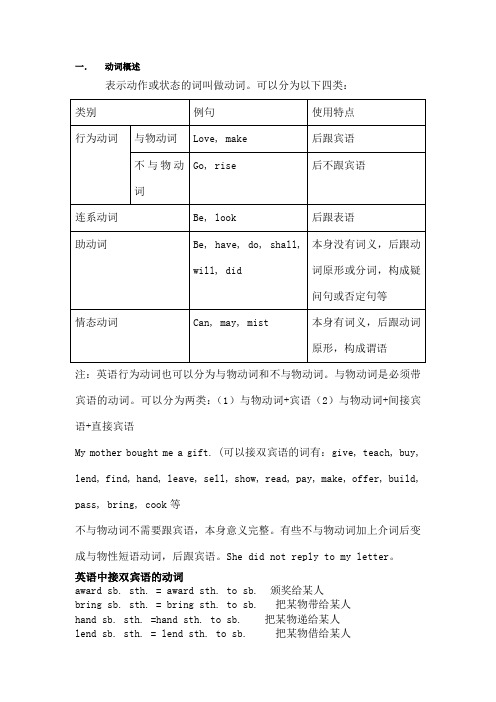
一.动词概述表示动作或状态的词叫做动词。
可以分为以下四类:注:英语行为动词也可以分为与物动词和不与物动词。
与物动词是必须带宾语的动词。
可以分为两类:(1)与物动词+宾语(2)与物动词+间接宾语+直接宾语My mother bought me a gift. (可以接双宾语的词有:give, teach, buy, lend, find, hand, leave, sell, show, read, pay, make, offer, build, pass, bring, cook等不与物动词不需要跟宾语,本身意义完整。
有些不与物动词加上介词后变成与物性短语动词,后跟宾语。
She did not reply to my letter。
英语中接双宾语的动词award sb. sth. = award sth. to sb. 颁奖给某人bring sb. sth. = bring sth. to sb. 把某物带给某人hand sb. sth. =hand sth. to sb. 把某物递给某人lend sb. sth. = lend sth. to sb. 把某物借给某人mail sb. sth. = mail sth. to sb. 把某物寄给某人offer sb. sth. = offer sth. to sb. 将某物给某人owe sb. sth. = owe sth. to sb. 欠某人某物pass sb. sth. = pass sth. to sb. 把某物递给某人pay sb. sth. = pay sth. to sb. 付给某人某物(钱)post sb. sth. = post sth. to sb. 把某物寄给某人read sb. sth. = read sth. to sb. 把某物读给某人听return sb.sth. = return sth. to sb. 把某物还给某人send sb. sth. = send sth. to sb. 把某物送给某人sell sb. sth. = sell sth. to sb. 把某物卖给某人serve sb. sth. = serve sth. to sb. 拿某物招待某人show sb. sth. = show sth. to sb. 拿某物给某人看take sb. sth. = take sth. to sb. 把某物拿给某人teach sb. sth. = teach sth. to sb. 教某人某物tell sb. sth. = tell sth. to sb. 告诉某人某情况throw sb. sth. = throw sth. to sb. 把某物扔给某人write sb. sth. = write sth. to sb. 给某人写信2、双宾语易位时需借助介词for的常用动词book sb. sth. = book sth. for sb. 为某人预定某物buy sb. sth. = buy sth. for sb. 为某人买某物choose sb. sth. = choose sth. for sb. 为某人选某物cook sb. sth. = cook sth. for sb. 为某人煮某物draw sb. sth. = draw sth. for sb. 为某人画某物fetch sb. sth. = fetch sth. for sb. 为某人去取某物find sb. sth. = find sth. for sb. 为某人找到某物fix sb. sth. = fix sth. for sb. 为某人准备某物get sb. sth. = get sth. for sb. 为某人拿来某物make sb. sth. = make sth. for sb. 为某人做某物order sb. sth. = order sth. for sb. 为某人订购某物pick sb. sth. = pick sth. for sb. 为某人采摘某物prepare sb. sth. = prepare sth. for sb. 为某人准备某物save sb. sth. = save sth. for sb. 为某人留某物sing sb. sth. = sing sth. for sb. 为某人唱某物(歌)spare sb. sth. = spare sth. for sb. 为某人让出某物steal sb. sth. = steal sth. for sb. 为某人偷某物3、有的动词后接的双宾语易位时,既可用介词to引出间接宾语,也可用介词for引出间接宾语,含义相同。
高考英语动词及动词短语考点详解

高考英语动词及动词短语考点详解一、【专项直击】【考情分析】动词是英语词汇中的核心,而动词及其构成的短语一直是高考中的热点和难点,特别是在完型填空题型及语法单项选择题中,有关动词及动词词组辨析的题就相当高频。
它的用法最灵活,其种类比较多,形式复杂。
每年高考中对动词短语和动词的考查都会30- 40% 的出现率,难度也比较大。
预测今后高考中特别要注意动词及其和介词、副词的搭配,以及构成的固定短语,要注意这些短语的意思,同时要在具体的语境中灵活地加以使用。
【知识要点】动词和动词短语是英语中最灵活、最难掌握的词之一,在历年高考题中所占比例也最大,设题时往往都是给出四个不同的动词或短语来测试考生在具体语境中对动词短语意义的理解和运用能力。
主要出现在单项选择及完形填空中。
要求考生构建以下比较完整的知识网络。
I.动词的分类根据意义和句法作用,英语动词可分为四类:1.行为动词(实义动词)①及物动词:带宾语的动词②不及物动词:不带宾语的动词注意:英语里及物动词和不及物动词不是截然分开的,有的动词既可以是及物动词也可以是不及物动词。
It is important for you to learn how to learn.第一个learn是及物动词,后面有宾语how to learn;第二个learn是不及物动词。
不及物动词向及物动词转化需要借助于介词、副词等构成短语动词。
He is working hard at English .③状态动词(相对静止):contain, exist, own, prefer, belong④动作动词:延续性(work, stay);非延续性(marry, go, come)2.系动词①表示人或事物的特征和状态:be, feel, look, seem, taste, appear, sound②表示状态的变化:turn, go, become, get, fall, grow③表示某种状态的延续或持续:remain, keep, stay注意:绝大多数连系动词又是实义动词,在解题时要正确区分,否则就会出错。
高考英语备考策略 语法非谓语动词的讲解与训练
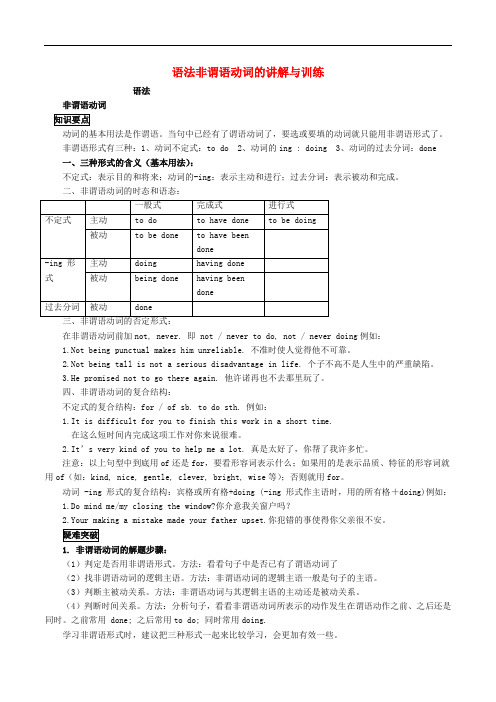
语法非谓语动词的讲解与训练语法非谓语动词动词的基本用法是作谓语。
当句中已经有了谓语动词了,要选或要填的动词就只能用非谓语形式了。
非谓语形式有三种:1、动词不定式:to do 2、动词的ing : doing 3、动词的过去分词:done一、三种形式的含义(基本用法):不定式:表示目的和将来;动词的-ing:表示主动和进行;过去分词:表示被动和完成。
二、非谓语动词的时态和语态:在非谓语动词前加not, never. 即 not / never to do, not / never doing例如:1.Not being punctual makes him unreliable. 不准时使人觉得他不可靠。
2.Not being tall is not a serious disadvantage in life. 个子不高不是人生中的严重缺陷。
3.He promised not to go there again. 他许诺再也不去那里玩了。
四、非谓语动词的复合结构:不定式的复合结构:for / of sb. to do sth. 例如:1.It is difficult for you to finish this work in a short time.在这么短时间内完成这项工作对你来说很难。
2.It’s very kind of you to help me a lot. 真是太好了,你帮了我许多忙。
注意:以上句型中到底用of还是for,要看形容词表示什么;如果用的是表示品质、特征的形容词就用of(如:kind, nice, gentle, clever, bright, wise等);否则就用for。
动词 -ing 形式的复合结构:宾格或所有格+doing (-ing 形式作主语时,用的所有格+doing)例如:1.Do mind me/my closing the window?你介意我关窗户吗?2.Your making a mistake made your father upset.你犯错的事使得你父亲很不安。
- 1、下载文档前请自行甄别文档内容的完整性,平台不提供额外的编辑、内容补充、找答案等附加服务。
- 2、"仅部分预览"的文档,不可在线预览部分如存在完整性等问题,可反馈申请退款(可完整预览的文档不适用该条件!)。
- 3、如文档侵犯您的权益,请联系客服反馈,我们会尽快为您处理(人工客服工作时间:9:00-18:30)。
动词的讲解与训练英语动词的分类。
1. 按词义和句中的作用,动词可以分为四类。
见下表:式如下。
(1)谓语动词(1. 助动词和情态动词(1)助动词:用于构成各种时态, 语态, 语气以及否定或疑问等结构。
它们本身没有词义,只和实义动词的一定形式构成复合谓语。
1)be (am, is, are, were, been)①“be + -ing”构成进行时态;②“be + 过去分词”构成被动语态;③“be + 动词不定式”构成复合谓语:表示按计划安排要发生的事。
The prime minister is to visit Japan next year. 用于命令。
You're to do your homework before you watch TV.2)have (has, had)①“have+过去分词”构成现在完成时态。
如:Have you visited the place ? ②“have been + -ing”构成现在完成进行时态。
如:What have you been doing these days?3)do (does, did)①“do/ does/ did not + 动词原形”构成行为动词的否定式。
如:His uncle doesn’t like playing football.;②“Do/ Does/ Did+ 主语 + 动词原形”构成行为动词的一般疑问句。
Does he go to work by bike every day? ③“do/did/does + 动词原形”用于祈使句或陈述句中表示加强语气。
如:I did go to see her, but she wasn’t in我确实去看望她了,但她不在家。
Do do some work. 请一定做点什么;④代替前面刚出现的动词以避免重复。
My mother told me to go to bed early. So I did.4)will, shall (would, should)“will (shall+动词原形”构成一般将来时,一般来说shall用于第一人称,will用于第二人称或第三人称,口语中常用will代替shall,如:We will have a meeting to discuss the problem.(2)情态动词:表示说话人对某一动作或状态的态度,可以表示“可能”、“可以”、“需要”、“必须”或“应当”等之意。
情态动词没有人称和数的变化。
但不能单独作谓语动词用,必须和不带to的不定式连用构成谓语动词(ought除外)。
1)情态动词的否定式,疑问式与简答① can能力(体力,智力,技能);允许或许可(口语中常用);可能性(表猜测,用于否定句或疑问句中)。
常用表达及句式如下:can not / cannot /can’t do例如:I can not / cannot /can’t do such a foolish thing. 我不可能做这样的傻事。
Can/ Could…do…?例如:Can/ Could I join your team? 我可以加入你的队伍吗?Yes,…can.No,/…can’t.可以的/不行。
could/ couldn’t do例如:I could/ couldn’t do the work. 我能/不能做这项工作。
② may可以(问句中表示请求);可能,或许(表推测);祝愿(用于倒装句中)may not do 例如:You may not do the work in time.你也许不能及时完成这项工作。
May…do…? Yes,…may.No,…mustn’t/can’t.例如:---May I come in? 我可以进来吗?---Yes, you may/can.可以的。
(No, you mustn’t/can’t.不行,你不能进来。
)Might 也许/可能(可能性较小,在两可之间,同could)might not do Might…do…? Yes,…might No,…might not.例如:You might be wrong because you can’t think it over.你也许错了,因为你没有仔细考虑。
--- I feel it so hot. Might the weather rain? 我感觉天这么热。
天会下雨吗?Yes, it might. 也许会的。
No,…might not.不会吧。
③ must必须,应该(表主观要求);肯定,想必(肯定句中表推测)must not/mustn’t do Must…do…? Yes,…must.No,…needn’t/don’t have to.例如:---You must go now. Or, you will be late.你必须现在动身,否则会迟到的。
---Yes, I must./No, I needn’t. I can ride my bike.是的,我应该现在动身。
/不必了,我可以骑自行车。
④ have to只好,不得不(客观的必须,有时态人称变化)don’t have to do例如:You don’t have to hurry because there is fifteen minutes left.你不必匆匆忙忙,因为还有十五分钟。
Do…have to do…?Yes,…do. No,…don’t.例如:---Do you have to finish it tonight? 你必须今晚完成吗?---Yes,I do./No, I don’t.是的,我必须今晚完成。
/不必了。
⑤ ought to应当(表示义务责任,口语中多用shouldought not to/oughtn’t t o do Ought…to do…?Yes,…ought. No,…oughtn’t.例如:When your mother is busy, you ought to help her do some housework.当你妈很忙的时候,你应该帮她做点家务。
⑥shall将要,会。
用于一三人称征求对方意见;用于二、三人称表示许诺、命令、警告、威胁等。
shall not/shan’t do Shall…do…?Yes,…shall. No,…shan’t.例如:You shan’t move, or I will shoot at you. 你不许动,否则我会朝你开枪。
---Shall he come into your office?他可以进你的办公室吗?---Yes, he shall./ No, he shan’t.可以/不行,不可以进来。
⑦ should应当,应该(表义务责任);本该(含有责备意味)。
should not/shouldn’t do Should…do…?例如:You should not/shouldn’t surf the internet day and night. 你不应该整日整夜地上网。
---Should we do anything for the old granny? 我们应该为那位老奶奶做点什么吗?---Yes, we should.是的,应该。
You should have learned these new words by heart yesterday.你昨天本应该背下这些生词(实际并未背)。
⑧ will意愿,决心;请求,建议,用在问句中would比较委婉。
will not/won’t do would not/wouldn’t Will/would…do…?Yes,…will/would.No,…won’t/wouldn’t.例如:---Will/Would you please have a dance with me?请你跟我跳个舞好吗?---Yes, I’d like to. /I’m sorry. I won’t/wouldn’t because I’m too tired.好的,我很乐意(对不起,我不想跳,我太累了)。
I will keep on working hard till success.我会坚持努力,直到最后成功。
⑨ dare敢(常用于否定句和疑问句中)dare not/daren’t do Dare…do…?Yes,…dare. No,…daren’t.例如:I dare not/daren’t tell my teacher the truth because I’m afraid that he will scold me.我不敢告诉老师这件事的真相,因为我怕他责备我。
---Dare you swim in this river? 你敢在这河里游泳吗?---Yes, I dare. /No, I daren’t because the water is too deep.我敢。
/不敢,因为河水太深。
⑩ need需要;必须(常用于否定句和疑问句中)need not/needn’t do Need…do…?Yes,…must. No,…needn’t.例如:---Must you finish your homework before you go home?你需要在回家之前完成作业吗?---No, I needn’t. I can do it at home.不必了。
我可以在家里做。
注意: used to过去常常(现在已不再)used not/ usedn’t/ didn’t use to do Used…to do…?Yes,…used.No,…use(d)n’t.Did…use to do…?Yes,…did. No,…didn’t.例如:Tom used to get up lately. 汤姆过去常起床晚(现在不是这样)。
---Used Mike to be late for school? 迈克过去常常上学迟到吗?---No, he didn’t use to..Yes, he used to.没有啊,他不常迟到。
(是啊,他常迟到。
) 2)情态动词must, may, might, could, can表示推测:以must为例。
must + do(be)是推测现在存在的一般状态进行;must + be doing 推测可能正在进行的事情;must +have done是推测可能已经发生过的事情。
① must“肯定,一定”语气强,只用于肯定句中。
例如:He must be a man from America. 和一定是来自美国。
